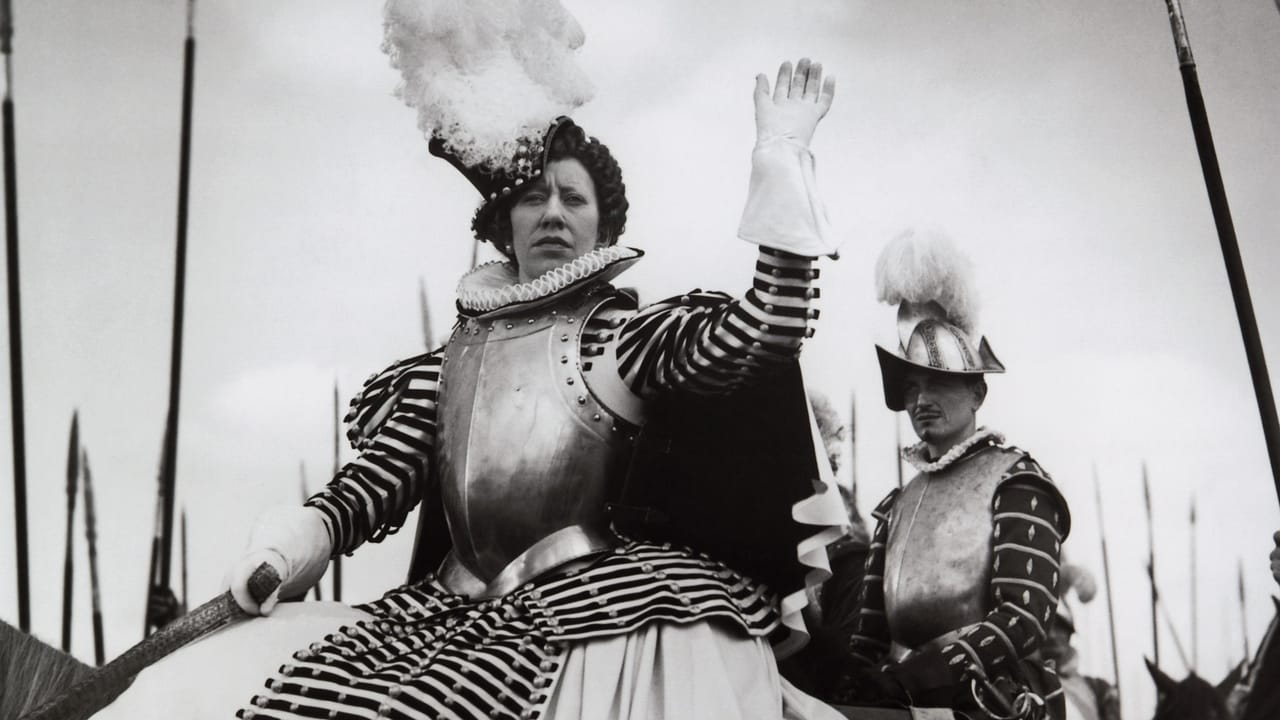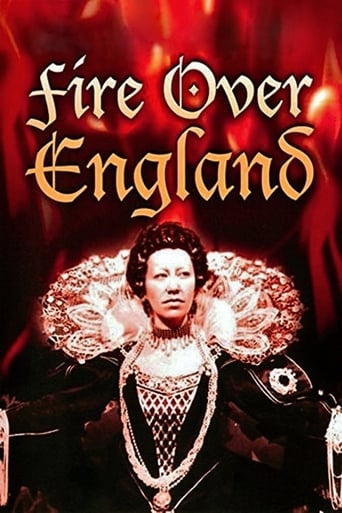



To me, this movie is perfection.
This movie was so-so. It had it's moments, but wasn't the greatest.
View MoreThe biggest problem with this movie is it’s a little better than you think it might be, which somehow makes it worse. As in, it takes itself a bit too seriously, which makes most of the movie feel kind of dull.
View MoreBlistering performances.
Copyright 10 March 1937 by London Film Productions, Ltd. New York opening at the Radio City Music Hall: 4 March 1937 (ran one week). U.S. release: 4 March 1937. U.K. release: March 1937. 92 minutes. SYNOPSIS: England defeats the Spanish Armada. NOTES: Although it failed to duplicate the enormous success of The Private Life of Henry VIII (1933), Fire Over England not only took excellent money but furthered the careers of no less than five upcoming box-office favorites: Laurence Olivier, Vivien Leigh, James Mason, Robert Newton and Raymond Massey. COMMENT: Lots of flag-waving, but plenty of action and even more importantly limitless artistry in this Korda follow-up to his blockbuster success, "Henry VIII". Although Flora Robson can't quite match the regal charisma of Charles Laughton's Henry (and the script seems over-eager to portray her as a sympathetic, grandmotherly figure), she gives the role a good shot. She does in fact manage to dominate many of her scenes, but this is often due to the weakness of her supporting players rather than any strengths of her own. Olivier, Banks and Leigh are all rather dull. Only philosophical old Morton Selten and villainous James Mason make much impression in the English court. The Spanish court, helped out by Raymond Massey's forceful Philip and Robert Newton's unwillingly helpful Don Pedro, has a bit more clout.Fortunately, neither Elizabethan politics nor cinematic romance are of great concern to the average picture-goer here. (Yes, I know it was a real-life meeting between Olivier and Leigh, but none of that passion is evident in their desultory exchanges on the screen). What ticket-buyers are looking for in "Fire Over England" is action. More action. And spectacle. Lavish spectacle. And that's what the picture provides. In spades. Of course what we critics want is neither romance nor action but artistry. And that also — thanks to the combined skills of photographer James Wong Howe and director William K. Howard — is dramatically delivered. Wong Howe regarded Howard as the greatest master of the cinema, and the most skillful and imaginative director he ever worked with. The images in this picture, with phenomenally effective use of back- lighting, are a testament to their combined genius.The staggering sets, the glittering costumes, the rousing montages, the pageant music score alike contribute mightily to this vibrant, vital and highly entertaining historical pastiche. OTHER VIEWS: We think Fire Over England is a very fine film. Its historical setting is good, the dialogue excellent, and the acting excellent also. — Sight and Sound.Lavish historical drama with enormous sets, crowds of extras and gorgeous costumes — but what a pity it was not filmed in color. Here is a production that literally cries aloud for the use of color. Wong Howe's lighting style is unusual for a period picture. He really pours on the light, this and the white sets giving the images very little contrast, except in the night scenes. Still the effect is quite pleasing.Laurence Olivier sings twice, antedating The Beggar's Opera, using his own voice. Howard's direction has some visual style and the action spots are put across with vigor — unusual to see Olivier in an Errol Flynn-type role.The film has, despite its obvious patriotic overtones, tremendous pace and while the characters are all one-dimensional figures, they are so skilfully acted (by Robson, Massey and Newton especially) as to almost wholly disguise this defect. Vivien Leigh, however, is rather a colorless heroine, though she looks lovely and does spark up once or twice when the script offers her the opportunity. — JHR writing as Tom Howard.
View MoreOther than the great cinematography by the marvelous James Wong Howe in the battle scenes, this film is a true stinker.This is the second film that I've seen in recent days directed by Alexander Korda. The first was Charles Laughton's "Rembrandt." It was so lousy that I shut it off. This one I'm afraid is not very much better.Flora Robson is as ugly as ever as Queen Elizabeth. Perhaps, her performance as the virgin Queen was good for 1937 standards but when you compare it to that of a Helen Mirren, it is absolutely no match. In robotic fashion, Robson states her lines. Her battle message to the English troops is so lackluster in spirit.Even a dashing Laurence Olivier can't save this utter piece of boredom.Future wife Vivien Leigh is in a supporting role here and she doesn't really convey anything here. To think, that Scarlett was 2 years later!It's a shame that history with the Spanish Armada is made out to be so boring in this film.
View MoreI'm afraid I was disappointed by "Fire over England", having pinned too many hopes on this film of all those in the Olivier season: based on a novel I'd loved as a child, starring Flora Robson as Queen Elizabeth with names such as Raymond Massey, James Mason and Robert Newton among the supporting cast, and featuring Vivien Leigh as the real-life love interest of a Laurence Olivier described as channelling Douglas Fairbanks and John Barrymore as he does all his own stunts, what could hold more promise? Like "The Sea Hawk", it was a picture I'd heard of and had long since been waiting to see.But great anticipation places an insuperable weight on a film. "The Sea Hawk" disappointed, and Olivier is no Flynn. The character is petulant and callow, admittedly -- but I couldn't identify with Michael emotionally (not aided by the fact that he appears to be trifling completely untroubled with the affections of two ladies at once, which deprived the love scenes of their conviction: it didn't come across as a conflict of loyalties, but as having your cake and eating it), and I found the action sequences uninspiring. The stunt dives look like belly-flops (presumably with an eye to the angle of the safety nets), the 'storm-tossed' ships wobble along with their sails obviously providing no propulsion whatsoever (would it have cost too much to have someone blow on them?), and the palace guards at the Escurial display a degree of stupidity in their pursuit that even in the context of cliché is less thrilling than ridiculous. The only moments of the Spanish adventure that worked for me at all were the double-edged dialogue at the dining table, and the 'spy' scenes with Raymond Massey.For the true honours of this production lie not with the adolescent hero but with the ageing generation. Massey invests the workaholic, melancholic Philip of Spain with a lethally plodding efficiency that makes him truly to be feared. The quietly-weighted exchange between the older Ingolby and his friend-turned-captor holds far more emotional impact than young Michael's histrionics when he finally cottons on (about a reel later than everybody else, audience included). The Queen's relationship with her boyhood's Robin is far deeper and better-portrayed than Michael's with Cynthia, and the memorable struggle is not Laurence Olivier with a sword in his hand but Elizabeth facing the loss of her youth.It is the grown-up drama that is worth watching here. But unfortunately this is not the main focus of the motion picture.
View MoreI remembered the title so well. To me, it was a Flora Robson movie with Olivier and Vivien Leigh in supporting roles. And it had Vincent Massey's voice from behind whiskers. Well Flora Robson was great. Her next signature, for me, would be "55 Days at Peking". The same role but with different sumptuous gowns. And the same voice. As for the Armada, it was a subtext. I like black-and-white films. Was everything done in Elizbethan times at night? It was talky and difficult to fathom, at times. I couldn't tell which was the love interest. Was it the Spaniard or was it Vivien Leigh? And I do not believe that Elizabeth I would have been the brilliant strategist to recommend that fire ships be sent against the Armada. Apparently it worked for the Empire, but not for the script. This might have been more accurate, historically, but Bette Davis had more engaging scripts. And I missed daylight!
View More